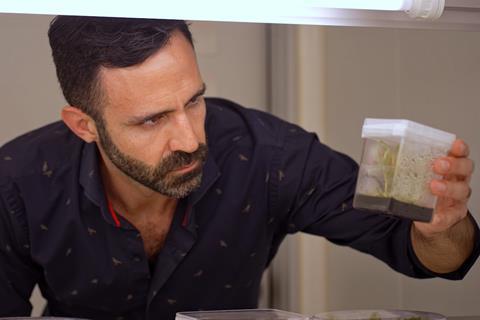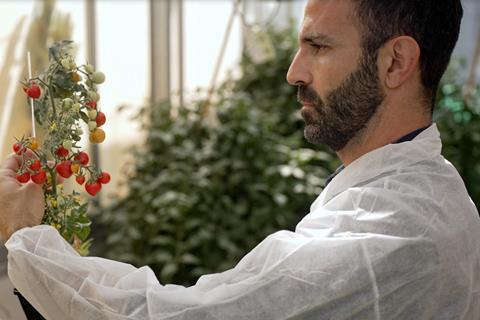Argentinian start-up Apolo Biotech is teaching plants to fight infections
Replacing some chemical pesticides with potentially safer, more environmentally benign alternatives is a significant challenge in agricultural biotechnology. Apolo Biotech, a startup in Argentina, is developing an RNA-based approach to enhancing plants’ defences against various threats.

The general approach is to introduce small, stabilised RNA molecules that can be incorporated into the plant’s immune response to block infections by interfering with the process of gene expression. ‘Plants have evolved the ability to absorb nucleic acids. They are sensing their environment all the time,’ says founder and chief scientific officer, Federico Ariel. ‘What we do is deliver information to plants,’ so they can learn how to defend themselves from attacks, he explains.
Although the principle sounds superficially similar to that of mRNA vaccines for humans – for example against Covid-19 – Ariel points out that plants’ immune biology functions very differently. ‘With the coronavirus vaccines we receive an injection of a messenger RNA (mRNA) that is translated into a viral protein.’ That triggers an immune response and production of antibodies against the virus. ‘In plants there are no antibodies, it is not mRNA but interference RNA’, he said. In plants, it is the RNA itself that acts to block infections. Once introduced, the plant can recognise and reproduce the interference RNAs in response to attack by pathogens.
One significant advantage of the technique, says Ariel, is that there is no permanent genetic modification to the plant, nor is there any chemical pesticide residue. So far, Apolo has proven the idea by protecting various vegetables from attack by fungi. But Ariel explains the principle could be used for other pathogens like viruses and bacteria. There are possibilities to use RNA interference to deter insect pests and even potentially even competition from weeds, although this is significantly harder, he acknowledges.

The idea looks simple but is not easy to implement. ‘We need to know a lot about the molecular biology and genetics of the entire system, like the genome of the plant and the pathogen.’ Apolo scientists have developed a bioinformatics platform, in collaboration with the Sadosky Foundation and the National institute of Agricultural Technology (INTA), that compares hundreds or thousands of genomes ‘to confirm that the solution we’ve generated is highly specific and attacks and blocks a particular pathogen, but it will not do anything to other fungi or to bees, fish and the rest of the ecosystem,’ says Ariel. ‘Today, a fungicide is sprayed and it kills bees, contaminates the water and the entire ecosystem. This is why the logic of food production is in crisis.’
Route to market
The company was spun out from Ariel’s research laboratory at Argentina’s Institute of physiology, molecular biology and neuroscience (Ifibyne/Conicet) after the team won a grant from Argentina’s science ministry for projects ‘against hunger’.
The commercialisation of Apolo products is currently facing a crucial issue around registration in Argentina. Because the technique is so novel, it requires convincing regulators to approve something that is not covered by current regulations. ‘This is our main issue right now,’ says Matías Badano, Apolo’s chief executive. Although 2024 was a hard year for science and research in the country, owing to budget cuts and layoffs in science ordered by Javier Milei’s government, he thinks that the company is progressing, albeit by baby steps. ‘The celebrity of the RNA molecule, which includes multiple Nobel prizes during the last 2 decades (particularly for the discovery of microRNAs in 2024), has helped us a lot,’ he says.
While none of Apolo’s products are yet approved, the company is performing trials in Ecuador, Colombia and Costa Rica for banana crops; and in Argentina, Brazil, Nicaragua and the US for peanuts. In total, Apolo has over 30 projects in the pipeline, including for tomatoes, strawberries, lettuce and grapes.
So far, the company has been supported by pre-commercial agreements and grants from domestic and international funders, without giving up any equity. In 2024, Apolo set up a pilot plant in Santa Fe province that produces enzymes, RNA and stabilisers. Now they are considering an investment round to escalate production. ‘The [eventual] strategy is to partner with companies that already have distribution for agricultural products,’ Badano explains, rather than trying to sell directly to farmers. Ariel adds that Apolo will produce the RNA, stabilise it and sell it to distributor companies.
Apolo Biotech
Date of founding: March 2022
Location: Port of Innovation, Santa Fe, Argentina
Number of employees: 30
Origin: Spin out from University of Litoral and Conicet (National Scientific and Technical Research Council of Argentina)












No comments yet